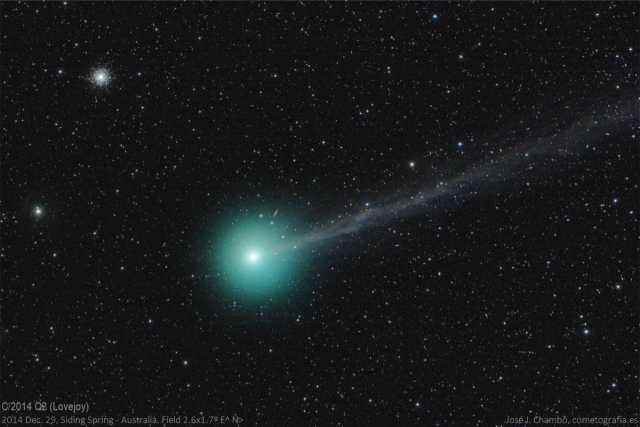
75 Years of Sky & Telescope: A lifetime of astronomy coverage
Sky & Telescope magazine's 75 years of astronomy coverage.

Countdown Begins for 2017's Coast-to-Coast Solar Eclipse
It's still a full year away, but huge throngs will be watching coast-to-coast when the Moon's shadow slides across the U.S.

Two Pairs of Planets Perform in the August Twilight
After sunset, Mars and Saturn join the star Antares in the southwest — while Venus and Jupiter create a dramatically "double star" low in the west.

August's Perseids: More Meteors This Year?
Sky & Telescope magazine predicts that this year's Perseid meteor shower will peak on the night of August 11–12 and, despite some moonlight, might be much better than usual.

Mars: Closest, Biggest, and Brightest in a Decade
Mars shines low in the southeast at nightfall, closer to Earth than it has been since November 2005. A Sky & Telescope press release.

May 9th's Transit of Mercury: How and When to See It
Use a telescope to spot Mercury's silhouette crossing the Sun's disk on May 9th for the first time since 2006. View it live using S&T's exclusive webcast.

Comet 252P/LINEAR Soars Into Predawn View This Week
A nearby comet is moving into view for Northern Hemisphere skywatchers. Despite bright moonlight nearby, you can try to spot it with binoculars and Sky & Telescope's exclusive finder chart.

How and When to See Five Planets at Once
During the next two weeks, for the first time in 11 years, you can see all of the naked-eye planets — from Mercury to Saturn — together in the predawn sky.

Geminid Meteors Will Dazzle on December 13th and 14th
If it’s clear this coming Sunday and Monday nights, keep a lookout high overhead for the "shooting stars" of the Geminid meteor shower.

Live HD Webcast of Sunday's Total Lunar Eclipse
A total lunar eclipse occurs in prime time for U.S. skywatchers on Sunday night, September 27th. Sky & Telescope is providing a professionally produced, HD webcast of the entire event.

Sunday Night's Prime Time Total Lunar Eclipse
Everything's lining up beautifully for the last total eclipse of the Moon until 2018. Make your plans for Sunday evening (Sept. 27, 2015).

August's Perseid Meteors: A "Must-See" Stargazing Event
Sky & Telescope magazine predicts that the Perseid shower will be at its peak late on Wednesday night (late on August 12th and early morning on the 13th).

Venus and Jupiter Create Breathtaking "Double Star" on June 30th
After gradually draw closer for weeks, Venus and Jupiter culminate their celestial dance with a dramatically close pairing — just 1⁄3° apart — in the western sky after sunset on Tuesday, June 30th.

Venus and Jupiter Put on a Show at Dusk
Each night during late June the two brightest planets are gliding closer together in the early evening sky. They're joined by a crescent Moon on June 19–20 and culminate with an ultra-close pairing on June 30th.

(Brief) Total Lunar Eclipse Before Dawn on April 4th
Before sunrise on Saturday, April 4th, the Moon skims just inside Earth's deepest shadow during a total eclipse that last only about 12 minutes. Circumstances favor locations in western North America and across the Pacific.

Close Pairing of Venus and Mars on February 20-21
On February 21st, Venus and Mars, Earth's two closest planetary neighbors, will pair tightly in the evening sky.

Mountain-size Asteroid 2004 BL86 Passes Earth on January 26-27
With a small telescope and good sky charts, you can watch a sizable near-Earth asteroid glide among the stars on the night of January 26–27.

Comet Lovejoy Glows Brightest During Mid-January
An icy visitor from the solar system's outer fringe is gliding into view in the evening sky.

Geminid Meteor Shower Returns December 13-14
If it’s clear this weekend, late on the nights of December 13th and 14th, keep a lookout high overhead for the "shooting stars" of the Geminid meteor shower.

North Americans To See Solar Eclipse on Thursday, October 23rd
Two weeks after seeing a total lunar eclipse in the wee hours of October 8th, skywatchers across North America get to witness (weather permitting) a partial solar eclipse on October 23rd.
